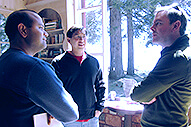 The common wisdom to creating a high-performance team is to populate it with members who have high IQs and who are the best in their respective field. Unfortunately, this isn’t always possible. More importantly, this common wisdom is flat out wrong.
The common wisdom to creating a high-performance team is to populate it with members who have high IQs and who are the best in their respective field. Unfortunately, this isn’t always possible. More importantly, this common wisdom is flat out wrong.
How else can you explain the poor team decision making that occurs in the upper echelons of businesses, governments, and other organizations? These institutions are not dictatorships, meaning they make their decisions in groups or committees — often chock full of really bright people. Enron was full of brilliant folks who, together, made some really horrendous decisions. Despite our inclination to believe otherwise, the whole is not always greater than the sum of its parts.
This doesn’t mean that groups are always wrong, but it begs the question — what makes for a high-performance team? One that makes smart decisions that result in the most benefit for all?
Well, it seems there are common characteristics in smart teams.
In a fascinating 2010 study by MIT’s Alex Pentland and Nada Hashmi, they divided a group of 697 volunteer participants into small teams and ran them through a variety of different tasks, some involving logic, some planning, coordination, reasoning, etc.
What they found was that average team IQ alone was not a great indicator of team success. Nor was a particular personality type, like having more extroverted team members. Rather, a set of three common characteristics emerged:
- Team members in smart groups contributed equally in discussions. They were not dominated by just one or two particularly outspoken members.
- Smart team members did well on the “Reading the Mind in the Eyes” test, an exam which measures people’s ability to judge complex emotion from facial photos which only reveal the eyes. (Click here to try the test out at Harvard’s website – I scored 29 out of 36. The average is 26, with women typically scoring a half point higher than men.)
- Having more women increased team performance. More specifically, not just a balance of women to men, but actually having more women on the team. As mentioned in point two, though, this is probably due to the fact that women are better at “mind reading” than men.
The revelations of the above study were fascinating on their own, but David Engel and Lisa X. Jing of MIT took these findings a step further with a similar study focused on remote work teams. How do the characteristics of a smart, high-performance work team play out in the era of telecommuting and using Google Hangouts, Skype, email, and chat? Turns out, the findings still applied. Interestingly, “mind reading” skills were just as important when most of the interactions were done online. The consensus being that beyond just reading facial expressions, having a general sense for other group member’s feelings, emotional states, and knowledge is the most important characteristic. In a nutshell, it’s emotional intelligence.
Putting It All Together: How to Ensure Your Team is “Smart”
So what does this mean to you in building your team, or in participating in one? How can you ensure that your team is set up to make smart decisions?
- Create mechanisms for ensuring equal contributions in discussions. Perhaps everyone in your group is given an allotted time period to offer their own personal suggestions in solving problems. Or maybe during meetings a new meeting facilitator is chosen each time.
- Develop your emotional intelligence through workshops, seminars, and other educational programs. Not all of us are blessed with natural “mind reading” skills, but there are ways to improve your abilities.
- Mix up the genders of your teams. Make sure that whenever possible you have a mix of men and women. Or make a concerted effort at having a mixture of individuals with higher emotional intelligence.
- Team Building Lessons – How Much Time Should We Spend Planning? - May 7, 2018
- Team Building Lessons – Do We Try a New Approach? - May 2, 2018
- Team Building Lessons - May 2, 2018
Interested in learning more about our team building and training options?
We'd love to talk to you!
Request Proposal



Leave a Reply